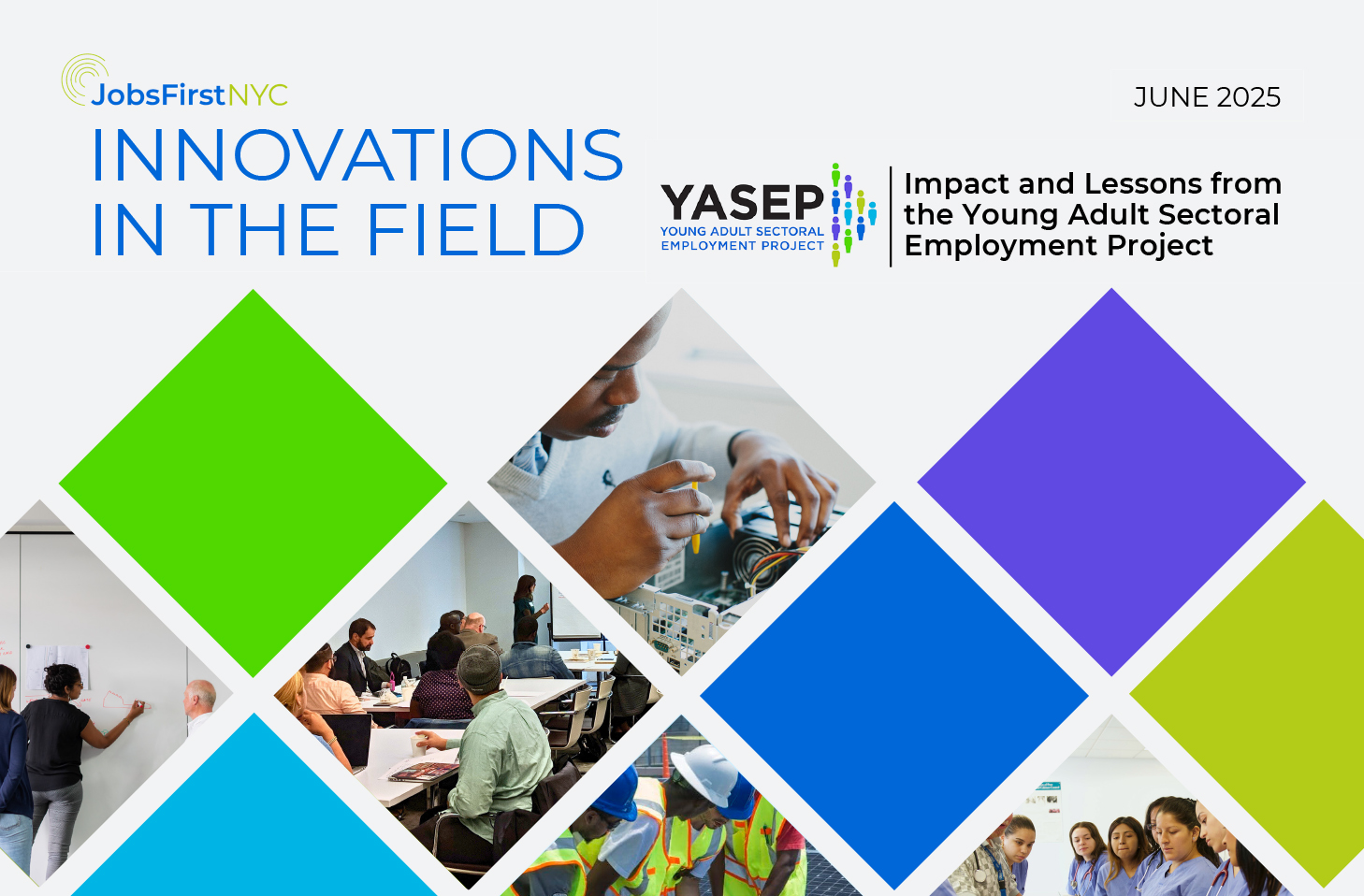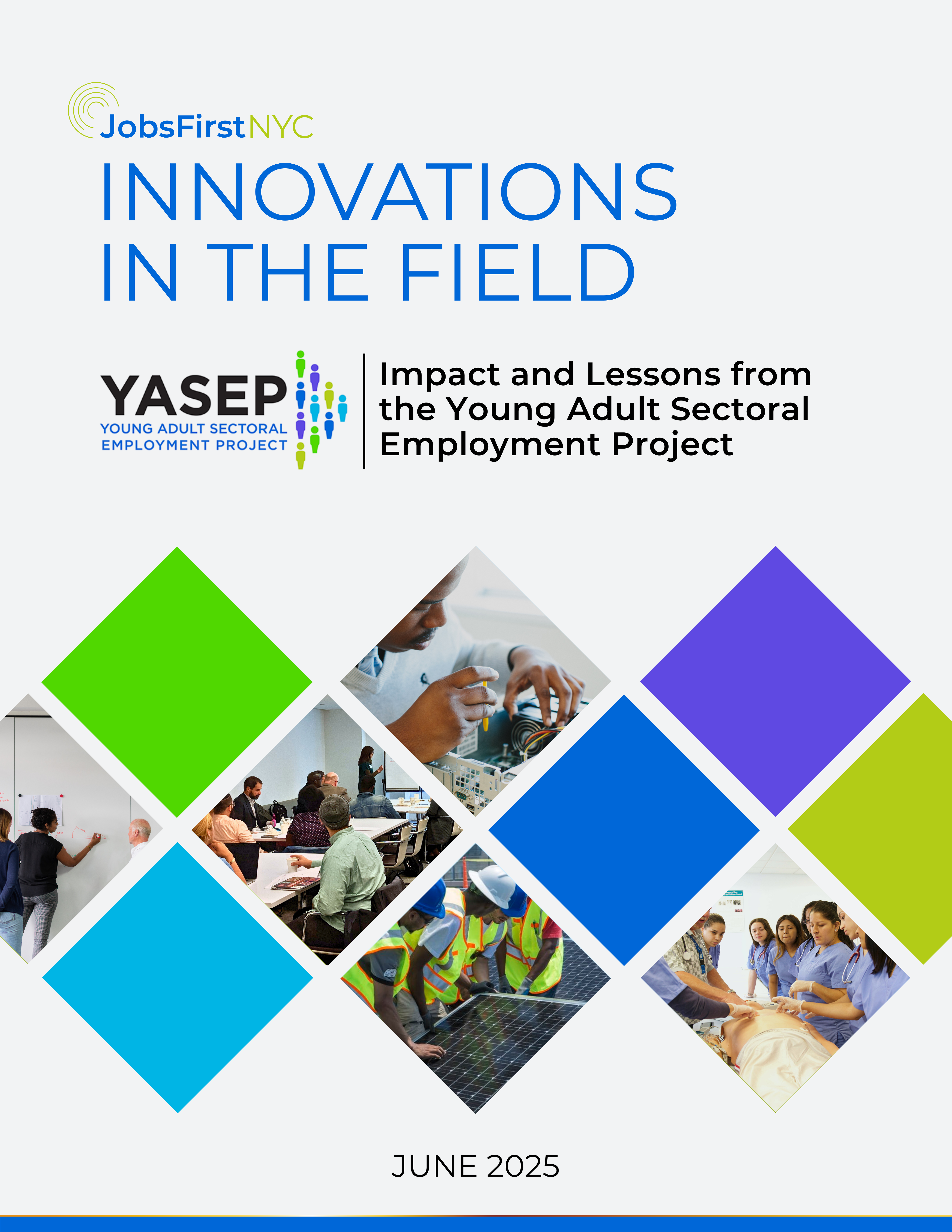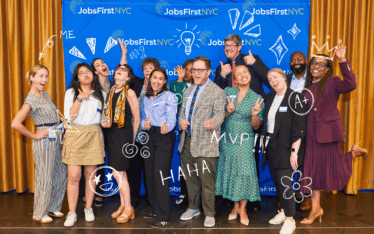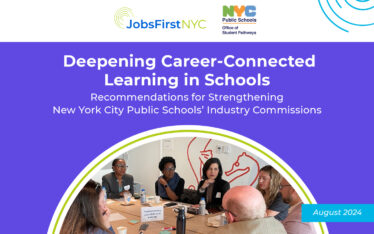All workforce development programs aim to build strong, sustained relationships with employers. But many struggle to make it happen.
As any job developer or industry partner will tell you, building long-lasting employer partnerships presents an ongoing challenge for the workforce development field. Employers lack the bandwidth to navigate government and nonprofit systems. At the same time, workforce development partners lack the industry knowledge and employer support needed to help clients, particularly young clients, successfully transition into entry-level roles. On top of that, current funding structures, which focus on key metrics like credentials earned and job placements, rarely provide training providers with the planning time required to build adaptive workforce programs that connect young adults to careers in a rapidly changing economy.
“While many institutions have been working effectively on an employer engagement agenda for many years, YASEP was the first such effort to really spread best sectoral employment approaches and overall employer engagement and support strategies across the field in New York City specific to youth programming; a tide that has risen all boats.”
– Roderick Jenkins, New York Community Trust
The reality is that it takes time and resources to establish durable employer partnerships. That’s exactly what inspired JobsFirstNYC to launch the Young Adult Sectoral Employment Project (YASEP) in 2013. Over five years, YASEP convened and funded 11 partnerships consisting of at least one community- based organization, one industry skills training entity, and a sector-specific employer or employer intermediary group. Through a series of Learning Communities, these partnerships created and launched customized pathways to employment for young adults while providing concrete, measurable value to employers. By the conclusion of the project, the YASEP partnerships helped connect 1,121 young people to jobs with numerous New York City-area employers. Additionally, and perhaps most notably, seven of the employer partners changed their hiring practices to better support new talent–including raising entry-level wages, changing their onboarding processes and growing direct talent pipelines with the skills training providers.
Innovations in the Field: Impact and Lessons from The Young Adult Sectoral Employment Project examines the development, implementation, and immediate and long-term impact of YASEP. By capturing the challenges faced and lessons learned along the way, the publication serves as a roadmap for workforce leaders seeking to design, test, and scale systems-level solutions that connect young adults to upwardly mobile careers.
YASEP’s Model: Designing Sector-Based Solutions for Young Adults
YASEP began with a question—Could and should industry-based workforce training programs be adapted to better serve young adults?—at a time when not a single young-adult-only sectoral training program existed in the country. Grounded in both research and real-world experience, JobsFirstNYC identified several foundational design principles that shaped how each of the 11 partnerships approached their work:
- Partnerships would be used to leverage the complementary organizational capacities of participating institutions. The idea was that more effective results can be achieved for jobseekers and employers if entities work within a partnership framework, tapping into the unique expertise of each.
- Employers would be active participants from the start. Employers would not merely advise as to how to most effectively meet their needs but would instead be direct participants in program design, testing, and implementation.
- Labor market intelligence would be used to inform programming. “Intelligence” would be more than mere data on jobs and the economy—it would include practitioners’ experiences working with employers; employers’ perspectives and advice; direct knowledge of businesses and industries; and prevailing labor market research.
- A space would be created for shared learning, program refinement, and course correction. Partnerships would receive planning grants to participate in multiple Learning Communities that encouraged experimentation and change along the way.
- Ongoing technical assistance and continuous access to customized labor market data would be provided. This would ensure that programming would be fully in line with employer demand.
- Positive youth development principles would be embedded in workforce strategies. By incorporating principles such as mentorship, structured support, hands-on learning, leadership opportunities, and long-term career navigation, the initiative would ensure that young adults are not only connected to a job, but also build the relationships, skills, and confidence needed for lasting economic mobility.
YASEP’s Results: Driving Systemic Change and Expanding Career Pathways
To understand whether this bold experiment could deliver lasting change, YASEP tracked its impact across four levels—individual, institution (focused on employers), partnerships and systems. Over the five year project, the partnerships not only connected young individuals to industry training and employment, but also reshaped training and hiring practices at the participating organizations and informed the design of government-funded programs. Notable impacts include:
- 2,135 participants enrolled in industry training.
- 1,121 participants obtained employment.
- 7 of 11 partnerships (64%) influenced or directly changed employer hiring and training practices that had a measurable impact on job quality for key occupations.
- 100% of employer partners reported improved onboarding and retention processes.
In addition to the numbers:
- One employer partner in the transit sector increased entry wages for key driver positions, leading to a reduction in new-hire turnover from 85% at 90 days to just 40% within one year.
- A workforce training provider in the green economy sector created a direct talent pipeline between their skills training program and an array of employers in the rapidly evolving energy field. The work resulted in the organization being able to take on larger employer accounts–they have since become a leading voice on the skills and competencies needed to fill roles in the still-emerging green economy.
- A theater non-profit and a stagehand union strengthened technical theater training and apprenticeships, leading to increased union membership for young adults and more connections to careers in the entertainment industry.
- YASEP’s model influenced the design and expansion of government-funded programs at agencies like New York City’s Department of Youth and Community Development (DYCD) and New York City Human Resources Administration (HRA).
Lessons Learned: Strengthening Sectoral Workforce Approaches
In addition to delivering some impressive results, YASEP surfaced a set of lessons that continue to shape how we think about building strong sectoral approaches, deepening collaboration, and sustaining impact for young adults and their communities.
- Invest in collaboration at every level. Sustained, multi-stakeholder partnerships require dedicated funding for both planning and ongoing collaboration. Public and private investments must work together to ensure long-term impact, as seen in models like the Catalyze Challenge and Good Jobs Challenge.
- Streamline data management to improve learning and reporting. Simplifying data systems will make it easier for organizations to track impact, refine strategies, and meet funder requirements efficiently. Investing in user-friendly tools and standardized reporting processes will strengthen collaboration across the field.
- Build resilient partnerships that can withstand staff turnover. Ensure continuity in programs by developing robust knowledge-sharing systems that reduce reliance on individual staff members. Centralized documentation and information management practices will help partnerships remain strong despite leadership changes.
- Create a centralized labor market intelligence system. Level the playing field by providing all workforce organizations—especially smaller community-based groups—with access to high-quality, real-time labor market data. A public, shared resource for labor market insights will help training programs stay aligned with employer demand.
- Establish clear, standardized employer value metrics. Develop and adopt a unified framework to measure the return on investment for employers partnering with workforce programs. Moving beyond turnover rates to include metrics like avoided staffing costs will better demonstrate the full value of sectoral strategies.
YASEP’s Legacy
While YASEP no longer exists in its original form, its legacy lives on through initiatives like the Transfer to Career Collaborative and the Sector Networks. These initiatives continue to build on YASEP’s foundational insights to strengthen collaboration among educational institutions, workforce training providers and employers to improve program design and skills training and increase young New Yorkers’ access to high-quality jobs. As we continue to integrate this important work into our practices and programs, we look forward to learning from others about their approaches to young adult talent development and welcome questions and dialogue about our efforts.
For more about YASEP, contact Keri Faulhaber, Senior Vice President at JobsFirstNYC via email at kfaulhaber@jobsfirstnyc.org.
About Innovations in the Field
Innovations in the Field is a series showcasing JobsFirstNYC’s pioneering projects and partnerships that drive economic mobility for young adults and the communities they call home. Through this series, we spotlight dynamic cross-sector collaborations for increasing economic opportunity. These initiatives highlight groundbreaking approaches for scaling effective solutions.





